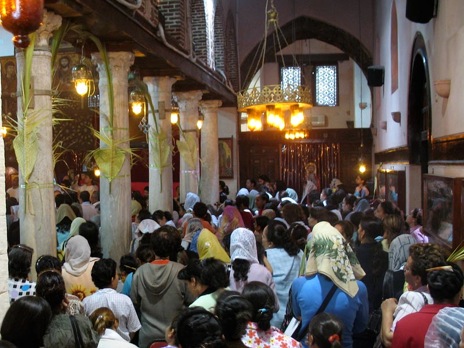CUSTOMS AND TRADITIONS
BAPTISM
Women deliver their babies either in a hospital or at home. After seven days, relatives and friends visit the new mother. The father purfies the child by washing him/her in a washbowl and prays the “Salat elTist”, Prayer of the Washbowl. The whole process of baptism takes about half an hour. All participants pray on the water of baptism for the child who is immersed three times in water sanctified with oil. On this special occasion the baby is dressed all in white. Baptism is immediately followed by two hours of prayer during which the child receives the holy secrets, called “Tanawel”. The parents then celebrate with their friends and relatives as they offer them sweets. The parents go to church after the child is born by forty days if it were a boy and by eighty days if it were a girl. Some married couples wishing to get pregnant pray in the church closest to their home and promise God to donate money or achieve a good deed for a specific church, if god were to make their wish come true. These couples on the day of baptism would have to fulfil their promises.

MARRIAGE
The entire marriage ceremony nowadays takes place in a church due to an official announcement from the church that all marriages would have to take place within church walls. However, in the past some Coptic marriages were performed at home. The newly-married couples celebrate with their relatives and friends in a restaurant, a hotel or a club, otherwise go home straight away. Very religious couples leave for a monastery, each to their own monastery to fast and pray for three successive days. The three days of praying and fasting refer to a story about a man called Tobia and a woman called Tobit. Tobit married several times and each time her husband was killed by the devil on the first night of their marriage. Tobit attained a very bad reputation and people started gossiping about her. When Tobit married Tobia, her father and husband prayed to God to protect this marriage. One day the angel Raphael appeared to Tobia and told him to pray and fast for three days to protect himself and his wife from the evil. Afterwards the story of Tobia and Tobit became a tradition among religious people to pray and fast for three days right after their marriage.

PRAYING IN THE CHURCH
Kamel is a “Shamaas” (deacon) and prays in the church four days a week and on Friday’s, too. His wife prays on Sundays and Wednesdays, their children on Fridays during school time and Sundays when they are off from school.
EASTER (Sham El-Nessim)
Sham El-Nessim also known as “Smelling the Breeze”, is a spring festival that is always celebrated on a Monday. Before Sham El-Nessim we fast for 55 days. During the entire period of fasting, we do not eat any animal products, known as “food with a soul”, and we pray at church every day. The Sunday before Sham El-Nessim is the day we commemorate the resurrection of Jesus and humanity. We fast, without eating or drinking, from 12 o’clock midnight until 6 o’clock in the evening of the following day. The last week of fasting, right before Sham El-Nessim, is called Passion Week where we pray in the church daily and read about the last days of Jesus in the holy book to empathize with his suffering. The Friday before Sham El-Nessim is called “The Great Friday” when the crucifixion happened. This day we all wear black and drink vinegar like Jesus did when he asked for water and they gave him vinegar to drink instead. On Easter Day (Sham El-Nessim) we eat fish, eggs, wear new clothes and visit one another.

NEW YEAR’S EVE
Before Christmas we fast for 43 days. We can have some food during the day, but eating “food with a soul” (meat, eggs, milk, cheese, butter, etc…) is not allowed. However, eating fish is permitted. On the day of the feast we go to church at 8 o’clock in the evening and pray until 12 o’clock midnight. At midnight the lights are turned off inside the church and candles are lit. Then sweets and toys are handed out among the congregation.
DEATH
When someone dies, a member of the family washes the body of the deceased. Only rarely does the family ask a professional to do the job for them, a man for a man and a woman for a woman. Then the body is dressed in a shroud and the family goes to church to pray for the dead. The priest pays his condolences to the family and thanks everyone who takes part in the funeral service. There is no rule specifying the day on which the deceased has to be buried. Each family buries their dead just as they wish. Three days after the burial the priests visit the family in their home to pray and water is poured on the floor throughout the flat. Tradition has it that relatives visit the family to mourn for forty days.

Family Kamel Bebawi Kamel
Old Cairo